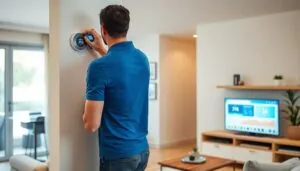Imagine waking up to the gentle hum of your coffee maker brewing the perfect cup, while your lights slowly brighten to mimic the sunrise. Sounds dreamy, right? With smart home installation services, that dream can become a reality. These tech-savvy professionals transform your humble abode into a cutting-edge haven where convenience and comfort reign supreme.
Table of Contents
ToggleOverview of Smart Home Installation Service
Smart home installation services provide comprehensive solutions for integrating technology into residential spaces. These services encompass a variety of devices, including smart thermostats, security systems, and lighting controls. Homeowners benefit from expert guidance throughout the setup process.
Professional installers assess individual needs and recommend the best technologies for various lifestyles. They typically handle device installation, configuration, and troubleshooting, ensuring everything operates smoothly. Installation can take place quickly and efficiently, often within a single day, depending on the complexity of the system.
Connectivity plays a crucial role in smart home systems. Many devices utilize Wi-Fi or Bluetooth technology for communication. This ensures a seamless user experience and allows for remote management through smartphones or tablets. Smart hubs often unify these devices, enabling centralized control.
Security remains a top priority for many homeowners. Advanced security features like cameras, motion sensors, and alarms can be easily integrated during installation. The convenience of controlling these systems from a mobile device provides peace of mind for users.
Energy efficiency represents another significant advantage. Smart thermostats optimize heating and cooling based on user behavior, potentially leading to reduced utility costs. Automated lighting can also enhance energy savings by adjusting to occupancy levels.
Smart home installation services not only improve convenience but also enhance the overall quality of life in the home. As technology progresses, these services evolve, offering homeowners the latest innovations. Investing in smart home solutions leads to increased comfort and improved home management.
Benefits of Smart Home Installation
Smart home installation services offer numerous advantages for enhancing daily life. Homeowners experience seamless integration of technology, leading to convenience and improved security.
Increased Convenience
Smart home systems simplify daily routines. Lights can turn on automatically at designated times, providing a warm welcome home. Devices communicate with each other, allowing for one centralized control system, reducing the need for multiple remotes or apps. Automation features enable users to set schedules for heating and cooling, making temperature management effortless. Voice-activated assistants streamline tasks, such as adjusting music volume or turning off appliances, with simple commands. Overall, convenience enhances the living experience through efficient technology integration.
Enhanced Security
A significant benefit of smart home installation is enhanced security. Homeowners can monitor their properties in real-time using security cameras and motion detectors linked to mobile devices. Smart locks provide secure access, allowing users to remotely control entry points. Alerts notify homeowners of unusual activity, ensuring a proactive response to potential threats. Additionally, intelligent lighting can simulate occupancy by activating at specific times, deterring intruders. These features collectively offer peace of mind, making home security more robust and manageable.
Types of Smart Home Devices
Smart home devices enhance convenience, security, and efficiency in daily living. Various categories exist, each tailored to meet specific needs.
Smart Lighting
Smart lighting systems allow users to control brightness and colors from a smartphone. Scheduling lights to turn on or off automatically enhances security by simulating occupancy. Dimming functions can create ambiance for different occasions. Voice-activated assistants integrate seamlessly with smart lighting, enabling hands-free control. Users can choose from smart bulbs or complete lighting fixtures, providing flexibility for any space.
Smart Thermostats
Smart thermostats optimize energy use by learning user behavior and adjusting temperature settings accordingly. Programmable schedules reduce heating or cooling when no one is home. Many models offer remote management through smartphone apps, allowing adjustment from anywhere. Reports on energy consumption empower users to make informed decisions, further enhancing efficiency. Installation is straightforward, with many devices compatible with existing HVAC systems.
Home Security Systems
Home security systems provide comprehensive protection through cameras, motion sensors, and alarms. Smart technology enables real-time monitoring via smartphone alerts. Users can control locks and surveillance cameras remotely for added peace of mind. Integration with other smart home devices can enhance functionality, such as triggering lights during an alarm event. Many systems offer professional monitoring services for continuous security, ensuring homeowners feel safe and secure.
Choosing a Smart Home Installation Service
Selecting the right smart home installation service significantly impacts the success of integrating technology at home. Homeowners should prioritize expert knowledge, customer reviews, and response time from potential providers.
Factors to Consider
Experience stands as a vital factor in choosing a service. Evaluating the provider’s history with smart devices and installations can reveal their efficiency. Certifications and partnerships with major technology brands highlight credibility. Pricing transparency influences decision-making; knowing the total costs, including installation and ongoing support, ensures no hidden surprises. Furthermore, ongoing technical support adds peace of mind post-installation, making it easier to resolve any issues that arise.
Questions to Ask Potential Service Providers
Inquiring about specific installation methods proves essential. Understanding their approach ensures compatibility with existing home systems. Ask about the range of devices they support to guarantee a comprehensive solution. Ensure to request references from previous clients for firsthand insights into service quality. Clarifying warranties on services and products also provides protection against future issues. Lastly, discuss customization options, as personalized solutions often align better with individual lifestyles.
Cost of Smart Home Installation Services
Costs for smart home installation services vary significantly based on several factors. Factors include the types of devices, the complexity of the installation, and regional pricing differences. Basic packages start around $100 to $300, covering simple installations like smart lighting or thermostat setups. More advanced systems, incorporating a range of devices, may elevate the cost to between $1,000 and $3,000.
Device complexity impacts the total cost. Smart home security systems, featuring multiple cameras and sensors, typically require additional labor, leading to higher expenses. Installation of a comprehensive home automation system, including smart hubs and extensive device integration, demands expert installers who may charge higher service fees.
Regional differences also play a significant role in pricing. Urban areas might exhibit higher service charges due to labor market dynamics, while rural locations may offer more competitive rates. Homeowners should expect to receive a detailed quote that outlines labor and material costs prior to starting the installation.
Moreover, some service providers offer subscription-based services for ongoing support, which adds to the total expenditure. Assistance can include regular system updates, maintenance checks, and troubleshooting, ensuring optimal performance over time.
Discounts and promotions frequently occur during seasonal sales or through referral programs. Homeowners should inquire about these opportunities to potentially lessen the overall installation cost. As smart home technologies evolve, staying informed about pricing trends and available options can yield financial benefits.
Smart home installation is an investment in convenience and security, aligning personal needs with modern technology. Understanding the cost structure aids homeowners in making informed choices for their smart home projects.
Smart home installation services transform living spaces into efficient and secure environments. By leveraging technology, homeowners can enjoy enhanced convenience and energy savings. Professional installers ensure that each system is tailored to individual needs, making the transition seamless and stress-free.
With the right service provider, integrating smart devices becomes an effortless process that elevates daily routines. Homeowners not only gain peace of mind through advanced security features but also embrace a lifestyle that prioritizes comfort and efficiency. Investing in smart home technology is more than a trend; it’s a step toward a smarter, more connected future.


